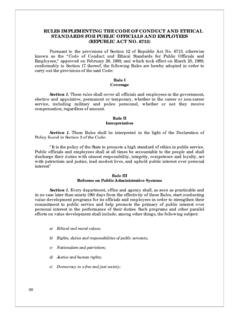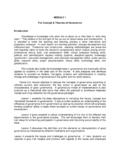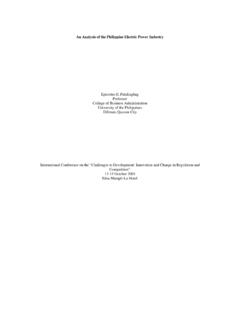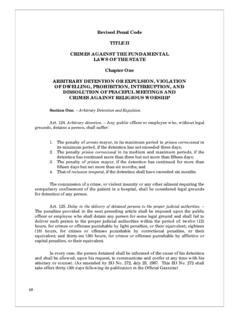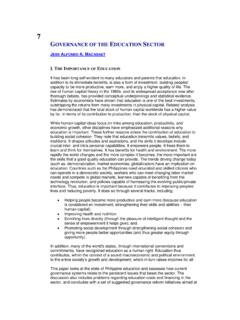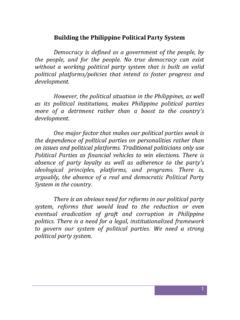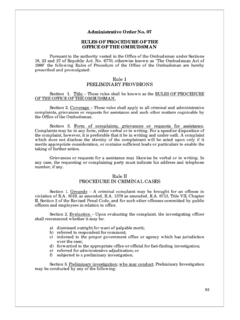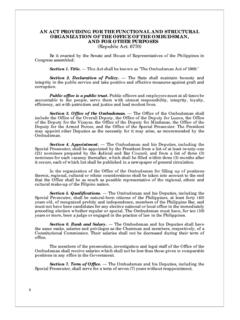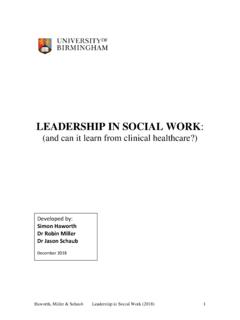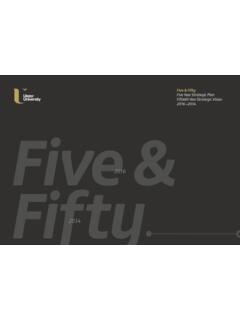Transcription of Philippine Political Culture and Governance
1 Chapter One: Philippine Political Culture and Governanceby Cristina Jayme MontielBack to Chapter 1 ContentsINTRODUCTION Months after the violence of "EDSA Tres," debate continues as to what triggered this bloody event. How dida seemingly ragtag crowd turn into an angry mob? Some say the uprising was a class war that drew itspower from the class divide in society, with the arrest of the masses' idol Joseph "Erap" Estrada as thespark that spread the wildfire (De Quiros, 2001). Others saw the siege of Malaca ang as the handiwork of asmall and currently disenfranchised elite, who after exploiting the poor, disowned responsibility for inflamingthe mob (Doronila, 2001).
2 This variety of interpretations could confuse the layperson, not only about EDSATres, but more so about the daily-life relations between Filipino politicians and their followers. This chapterprobes the source of this Filipino Political CulturePolitics involves the production, allocation and use of decision-making powers among large groups ofindividuals. In stable and strong states, Political activities usually refer to the powers of the state to unstable and weak states, politics encompasses social power issues within and outside the boundariesof the 'legitimate' refers to everything socially created (Fiske, 1996).
3 One essential characteristic of Culture is that it isshared by different groups of interacting humans. Culture includes both subjective and objective elements(Aretxaga, 1993; Barnard, 1969; Clark, 1991; Cole, 1996; Diamond, 1989; Gibbins and Reimer, 1999;Hobart, 1986; Kamrava, 1995; Myers and Martz, 1997; Nesbitt-Larking, 1992; Norbu, 1992; Wood, 1993;Warren, 1993). Subjective elements cover shared group mentalities -- thoughts and feelings. Objectivecultural elements include material symbols, artifacts, and group-accepted practices. The subjective andobjective elements of Culture have a two-way relationship.
4 For example, material symbols acquire meaningas particular thoughts and feelings become associated with these symbols (the Nazi swastika, for instance).Likewise, cultural practices evoke specific feelings when carried out by society Political Culture is a systematically related set of mental and concrete constructions. It includes but isnot limited to beliefs, feelings, group-accepted practices, language and paraphernalia shared by largegroups of Filipinos as they produce, allocate and use Political powers within, outside, and in interaction withthe 1 lists some subjective components of Filipino Political Culture and gives examples to illustrate howgroup subjectivities are activated during Political exercises.
5 These subjective components arepsychological, although they do not pertain to specific individuals but to interacting 1. Subjective components of Filipino Political Culture Subjective components of Filipino Political cultureExamples of how group subjectivities are activatedduring Political exercisesIdeology-inspired shared interpretations of politicaleventsDuring the Visiting Forces Agreement debate, oneideological view saw the VFA as a new form of UScolonial interventionShared mental scripts"Volunteer" campaigners carry a widely accepted mentalscript that those who help in a candidate's campaign getrewarded with a job and/or government contracts if thecandidate winsNegative emotions toward outgroup membersMembers of one faction in Malaca ang Palace carry intheir mind (sometimes exaggerated)
6 Narratives of whatthe rival camp is scheming and plotting against themCollective memoriesThe anti-Marcos group still hold memories of howconstitutional changes can be used to rationalize thedeclaration of martial lawReligious beliefsReligious faith includes working for social justice andworking in favor of issues such as land distribution Objective components of Political Culture include directly observable Political practices, language, andartifacts. Some care is needed in studying objective Political Culture . What is observable could contain latentor symbolic meanings that are not outwardly obvious to a person who merely relies on external evidence toobtain cultural information.
7 Objective Political Culture is usually context-dependent and meaning-sensitive(Cole, 1996). Table 2 presents a few objective aspects of Filipino Political Culture and examples of objectiveculture. It also shows how objective Political Culture can take on manifest and latent meanings. Table 2. Objective components of Filipino Political Culture . Objective components ofFilipino Political cultureExamplesofobjectivepolitical cultureManifest meaning: whatis directly observedLatent meaning: what issymbolized or impliedPolitical practiceHouse Representative is askedby a local leader to act as thegodfather at the wedding of theleader's daughterInvitation to be the daughter'swedding godfatherIn the future, the local leader'sfamily can expect to be givenemployment opportunities andother special politico-economicfavors by this powerful turn, the Representative canexpect the leader's family to helpduringthecampaignperiod(Hollnsteiner , 1963)A top general of the PhilippineNationalPolice(PNP)
8 Istransferred out of Metro Manila toa far-away provincial postThis is part of the regular cycle ofpost-changing among general is not favored by thenew PNP chief and is nowpolitically impotent within thePNP influence language"Huwagn'yoakongsubukan."("Don'tc hallengeme.")"Don't challenge me."I am powerful and you are 't threaten me, or I will hitback at you."Doon tayo mag-usap" from atraffic policeman to a trafficviolator"Let's talk over there (far from theeyes of other people)."Hand over some bribe moneyand I won't give you a violationticket this artifactERAP car plate, during Erap'spresidencyI like President Erap enough touse his name as my car have powerful connections withthe President, so don't charge mewith any traffic violation or youmay get into trouble streamers, bannersduring street ralliesContent of whatever is printed onthe streamers, bannersGroupswithred-coloredstreamers/ba nnersareassociatedwithleft-of-centerpoli ticalbeliefsandpoliticalformations.
9 Political Culture in Context: Time-Sensitive, Peer-Boundand Structure-EmbeddedPolitical cultures and orientations thrive in specific contexts, particularly conditions of historical time, peer-group associations, and social structures. Inevitably, Political practices and shared beliefs interact withhistorical con-ditions, including prevailing technologies of information. For example, with the onset of thedigital age, the 2001 EDSA Dos mobilizations used email and cellphone texting as effective communicationchannels. The 1986 EDSA Uno uprising depended on telephone brigades, printed manifestos and peer group also plays a vital role in Political orientations since the individual tends to be group-sensitive, especially in collectivist cultures like the Philippines.
10 Studies show that collectivist culturesemphasize groups as the basic unit of social perception (Triandis, 1994). Individuals in these cultures tendto define themselves terms of in-group relations (Triandis, McCusker, and Hui, 1990). Usually, they will alterthe self in favor of the situation rather than the situation in favor of the self (Diaz-Guerrero, 1979). Philippinecollectivist Culture provides fertile ground for traditional Political influence based on patronage (Hollnsteiner,1963; Kerkvliet, 1990; Lande, 1965; Lynch, 1979), kinship (Canieso-Doronila, 1997; Lande, 1958; Roces,1998; Timberman, 1991; Zialcita, 1997), and personalistic leadership styles (Hollnsteiner, 1970; Kerkvliet,1990; Roces, 1998).
